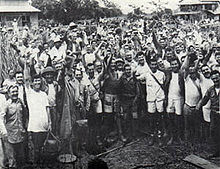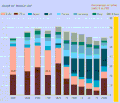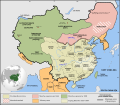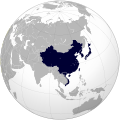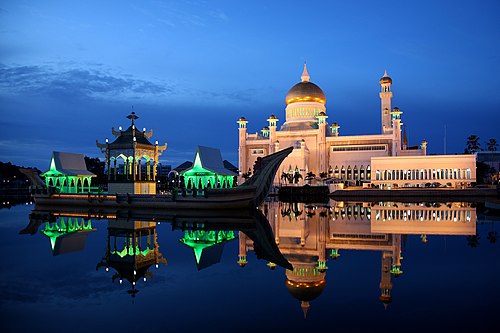Portal:Asia

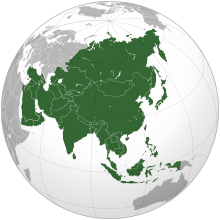 Asia (/ˈeɪʒə/ AY-zhə, UK also /ˈeɪʃə/ AY-shə) is the largest continent in the world by both land area and population. It covers an area of more than 44 million square kilometers, about 30% of Earth's total land area and 8% of Earth's total surface area. The continent, which has long been home to the majority of the human population, was the site of many of the first civilizations. Its 4.7 billion people constitute roughly 60% of the world's population. Asia shares the landmass of Eurasia with Europe, and of Afro-Eurasia with both Europe and Africa. In general terms, it is bounded on the east by the Pacific Ocean, on the south by the Indian Ocean, and on the north by the Arctic Ocean. The border of Asia with Europe is a historical and cultural construct, as there is no clear physical and geographical separation between them. It is somewhat arbitrary and has moved since its first conception in classical antiquity. The division of Eurasia into two continents reflects East–West cultural, linguistic, and ethnic differences, some of which vary on a spectrum rather than with a sharp dividing line. A commonly accepted division places Asia to the east of the Suez Canal separating it from Africa; and to the east of the Turkish Straits, the Ural Mountains and Ural River, and to the south of the Caucasus Mountains and the Caspian and Black seas, separating it from Europe. China and India traded places as the largest economies in the world from 1 to 1800 CE. China was a major economic power for much of recorded history, with the highest GDP per capita until 1500. The Silk Road became the main east–west trading route in the Asian hinterlands while the Straits of Malacca stood as a major sea route. Asia has exhibited economic dynamism as well as robust population growth during the 20th century, but overall population growth has since fallen. Asia was the birthplace of most of the world's mainstream religions including Hinduism, Zoroastrianism, Judaism, Jainism, Buddhism, Confucianism, Taoism, Christianity, Islam, Sikhism, as well as many other religions. (Full article...) Featured articleThe Raid at Cabanatuan (Filipino: Pagsalakay sa Cabanatuan), also known as the Great Raid (Filipino: Ang Dakilang Pagsalakay), was a rescue of Allied prisoners of war (POWs) and civilians from a Japanese camp near Cabanatuan, Nueva Ecija, Philippines. On January 30, 1945, during World War II, United States Army Rangers, Alamo Scouts and Filipino guerrillas liberated more than 500 from the POW camp. After the surrender of tens of thousands of American troops during the Battle of Bataan, many were sent to the Cabanatuan prison camp after the Bataan Death March. The Japanese shifted most of the prisoners to other areas, leaving just over 500 American and other Allied POWs and civilians in the prison. Facing brutal conditions including disease, torture, and malnourishment, the prisoners feared they would be executed by their captors before the arrival of General Douglas MacArthur and his American forces returning to Luzon. In late January 1945, a plan was developed by Sixth Army leaders and Filipino guerrillas to send a small force to rescue the prisoners. A group of over 100 Rangers and scouts and 200 guerrillas traveled 30 miles (48 km) behind Japanese lines to reach the camp. (Full article...)Selected Country Uzbekistan, officially the Republic of Uzbekistan, is a doubly landlocked country located in Central Asia. It is surrounded by five countries: Kazakhstan to the north, Kyrgyzstan to the northeast, Tajikistan to the southeast, Afghanistan to the south, and Turkmenistan to the southwest, making it one of only two doubly landlocked countries on Earth, the other being Liechtenstein. Uzbekistan is part of the Turkic world, as well as a member of the Organization of Turkic States. Uzbek is the majority language, while Russian is widely spoken and understood. Islam is the predominant religion, and most Uzbeks are Sunni Muslims. The first recorded settlers in the land of what is modern Uzbekistan were Eastern Iranian nomads, known as Scythians, who founded kingdoms in Khwarazm, Bactria, and Sogdia in the 8th–6th centuries BC, as well as Fergana and Margiana in the 3rd century BC – 6th century AD. The area was incorporated into the Achaemenid Empire and, after a period of Greco-Bactrian rule, was ruled by the Parthian Empire and later by the Sasanian Empire, until the Muslim conquest of Persia in the seventh century. The early Muslim conquests and the subsequent Samanid Empire converted most of the people into adherents of Islam. During this period, cities began to grow rich from the Silk Road, and became a center of the Islamic Golden Age. The local Khwarazmian dynasty was destroyed by the Mongol invasion in the 13th century, leading to a dominance by Turkic peoples. Timur (Tamerlane) in the 14th century established the Timurid Empire. Its capital was Samarkand, which became a centre of science under the rule of Ulugh Beg, giving birth to the Timurid Renaissance. The territories of the Timurid dynasty were conquered by Uzbek Shaybanids in the 16th century. Conquests by Emperor Babur towards the east led to the foundation of the Mughal Empire in India. All of Central Asia was gradually incorporated into the Russian Empire during the 19th century, with Tashkent becoming the political center of Russian Turkestan. In 1924, national delimitation created the Uzbek Soviet Socialist Republic as a republic of the Soviet Union. It declared independence as the Republic of Uzbekistan in 1991. (Full article...)Featured biographyChan Kong-sang SBS MBE PMW (born 7 April 1954), known professionally as Jackie Chan, is a Hong Kong actor, director, writer, producer, martial artist, and stuntman known for his slapstick acrobatic fighting style, comic timing, and innovative stunts, which he typically performs himself. Before entering the film industry, he was one of the Seven Little Fortunes from the China Drama Academy at the Peking Opera School, where he studied acrobatics, martial arts, and acting. Chan has been acting since the 1960s, performing in more than 150 films. He is one of the most influential action film stars of all time. After appearing in many Hong Kong films as a stuntman, Chan's first major breakthrough was the 1978 kung fu action comedy film Snake in the Eagle's Shadow. He then starred in similar kung fu action comedy films such as 1978's Drunken Master and 1980's The Young Master. In 1979, he made his directorial debut with The Fearless Hyena, which was a box office success. 1983's Project A saw the official formation of the Jackie Chan Stunt Team and established Chan's signature style of elaborate, dangerous stunts combined with martial arts and slapstick humor, a style he further developed in a more modern setting with 1984's Wheels on Meals and 1985's Police Story. Rumble in the Bronx (1995), which had a successful worldwide theatrical run, brought Chan into the North American mainstream, leading to a successful Hollywood career with the Rush Hour and Shanghai series. In 2010, Chan appeared in his first dramatic role in an American film, The Karate Kid. (Full article...)General imagesThe following are images from various Asia-related articles on Wikipedia. Featured pictureDid you know...
Updated: 6:33, 14 February 2024 In the news
Related portalsMajor Religions in Asia Middle East Central Asia and Surroundings Indian Subcontinent Southeast Asia East Asia Selected panorama
The Taj Mahal (Hindi: ताज महल, from Persian/Urdu: تاج محل "crown of palaces") is a white Marble mausoleum located in Agra, India. It was built by Mughal emperor Shah Jahan in memory of his third wife, Mumtaz Mahal. The Taj Mahal is widely recognized as "the jewel of Muslim art in India and one of the universally admired masterpieces of the world's heritage." Taj Mahal is the finest example of Mughal architecture, a style that combines elements from Persian, Turkish and Indian architectural styles. TopicsCategoriesAssociated WikimediaThe following Wikimedia Foundation sister projects provide more on this subject:
More portalsShortcuts to this page: Asia portal • P:ASIA Purge server cache |
- Pages using the Phonos extension
- Portals that need updating
- Portals with triaged subpages from January 2021
- All portals with triaged subpages
- All portals
- Portals with no named maintainer
- Pages including recorded pronunciations
- Pages using Template:Post-nominals with customized linking
- Random portal component with over 50 available image subpages
- Random portal component with 11–15 available image subpages
- Asia
- Asian portals
- WikiProject Asia
- Portals by continent
- Asia portal
